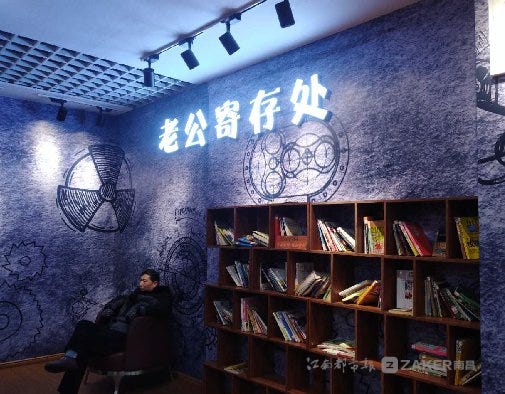Husband Storage Areas Are Spreading Across China
No More Complaining Husbands or Boyfriends While Shopping! 😎
Word of the week: 老公寄存处 (lǎogōng jìcún chù)
Meaning: Husband Storage Area
“I’m tired, let’s go home!”, “You already have so many shoes!”, “You’ve been to this store so many times already!”—sound familiar?
The Chinese have come up with a solution to deal with grumpy husbands and boyfriends: the Husband Storage Area (老公寄存处).
First introduced in 2016, these areas have now spread to almost every mall across the country in recent years.
逛超市连老公也能“存”了,被寄存的男士,可以在里面上网、看电视、抽烟等。此举主要为那些怕逛街,但又不得不陪着妻子出来的男士准备的,“老公寄存处”能很好地化解陪妻逛店苦。即可以满足男性顾客的等候需要,也可以为商圈加大收入。既增加了经济效益,又考虑到社会效益。
此举 (cǐ jǔ): this action, this move
化解 (huà jiě): to resolve, to alleviate
顾客 (gù kè): customer
商圈 (shāngquān): a business or commerce
效益 (xiào yì): benefit, effectiveness
You can even “store” your husband while shopping at the supermarket! Men left at these “Husband Storage Areas” can browse the internet, watch TV, smoke, and more.
This concept is designed primarily for men who dread shopping but feel obligated to accompany their wives. The “Husband Storage Area” helps alleviate the misery of shopping for husbands while meeting their needs for a comfortable waiting space.
At the same time, it benefits the shopping districts by increasing revenue. It’s a win-win, boosting both economic and social benefits.
“老公寄存处,这个地方好!以前每次逛街,看到老公痛苦的表情,于心不忍,又不愿意他独自在家。现在好了,蓝色港湾的这个‘老公寄存处’真的挺解决问题的。”一位正在购物的林女士接受采访时这样说道。 陪老婆逛街,是男人的苦差事。于是“老公寄存处”便出现了。不爱逛街的老公被老婆“寄存”此处,看书、赏画、喝茶,吸烟,逃了逛街苦,不亦乐乎。不过“寄存老公”也引起了顾客们的议论。
于心不忍 (yú xīn bù rěn): to be unwilling to bear (emotionally), to have a heartache (usually in the context of not wanting to cause someone pain)
港湾 (gǎngwān): a harbor or port
说道 (shuō dào): to say, to mention (in spoken context)
苦差事 (kǔ chāi shì): a difficult or unpleasant task
不亦乐乎 (bù yì lè hū): expressing enjoyment or satisfaction (literally "isn't it fun?" or "how delightful!")
“Husband storage areas are great! In the past, every time we went shopping, I couldn’t bear to see my husband’s pained expression, but I also didn’t want to leave him home alone. Now it’s much better—this ‘husband storage area’ at Blue Harbor really solves the problem,” said Ms. Lin, who was shopping when interviewed.
Accompanying their wives on shopping trips has long been a chore for men. That’s why “husband storage areas” have emerged. Husbands who don’t enjoy shopping can be “stored” here by their wives to read books, admire artwork, drink tea, or smoke. Escaping the misery of shopping has made them quite content. However, the concept of “storing husbands” has also sparked discussions among customers.
‘老公寄存处’是个好地方,创意也不错。以前来逛街,看到先生痛苦的表情,于心不忍,又想让他陪我逛街,现在可以‘寄存’起来了,他反抗情绪稍有好转。”据前来购物的周小姐介绍,她老公正在寄存处上网呢。
同时,也有一些人对此表现出了反感,认为商场设置“老公寄存处”有哗众取宠之嫌,实际意义不大。
对于“老公寄存处”的建设,“老公们”提出了许多建议,“首先环境要好,还要提供游戏、啤酒、小吃和杂志打发时间,要是还能配备几名美女服务员就最好了!”但老婆们不能完全赞同:“‘老公寄存处’应配备男性服务员。如果配备妖艳的美女服务,违背我们存放的初衷,导致其今后乐不思蜀,反而老想逛街。
创意 (chuàng yì): creativity, creative idea
反抗情绪 (fǎn kàng qíng xù): resistance, rebellious feelings
反感 (fǎn gǎn): to dislike, to feel repelled
哗众取宠之嫌 (huá zhòng qǔ chǒng zhī xián): to be seen as a gimmick to attract attention, to pander to the crowd
打发时间 (dǎfa shíjiān): to pass the time.
配备 (pèi bèi): to equip, to provide with (facilities, resources, etc.)
赞同 (zàn tóng): to agree with, to approve
妖艳 (yāo yàn): alluring, seductive (usually with a negative connotation)
违背 (wéi bèi): to violate, to go against
乐不思蜀 (lè bù sī shǔ): to be so happy that one forgets to return home (figuratively, to be so content that one doesn’t want to leave)
The "Husband Storage" is a great place with a nice concept. Before, when I went shopping and saw my husband’s pained expression, I couldn’t bear it. I wanted him to accompany me, but now I can "store" him here. His resistance has improved a bit." Miss Zhou, a shopper, shared that her husband is currently online at the storage place.
At the same time, some people have shown their disapproval, believing that setting up a "Husband Storage" in the mall is a gimmick with little real significance.
As for the design of the "Husband Storage," many husbands have made suggestions: "First, the environment should be good, and there should be games, beer, snacks, and magazines to pass the time. It would be best if there are a few beautiful female attendants!" However, the wives do not fully agree: "The 'Husband Storage' should have male attendants. If it's staffed with alluring female attendants, it goes against the original intention of storing them, and they might end up enjoying it and wanting to stay longer, and eventually, they'll want to shop again."
专家表示,目前国内商场这样给顾客提供休息的地方还很少,所以在大型商场中设置这样的区域是值得提倡的。商场的初衷也是想推出一种新的经营方式,通过完善自身服务以增加经济效益。从社会学角度来看其实也是一种文化的体现。但是把“寄存”二字用在老公们身上,的确有些不妥,虽然是一种幽默的口吻,但却显得对男性不够尊重,改为“男士休闲处”似乎更好些。
提倡 (tí chàng): to advocate, to promote
初衷 (chū zhōng): original intention, initial goal
经营 (jīng yíng): to manage, to operate (a business or activity)
体现 (tǐ xiàn): to embody, to reflect
不妥 (bù tuǒ): inappropriate, improper
口吻 (kǒu wěn): tone (of voice or style)
Experts say that currently, very few shopping malls in China provide resting areas for customers, so setting up such spaces in large malls is worth encouraging. The mall’s intention is to introduce a new business model by improving its services to increase economic benefits. From a sociological perspective, it also reflects a certain cultural aspect.
However, using the term “storage” for husbands is somewhat inappropriate. Although it is meant humorously, it lacks respect for men. Renaming it to “Men’s Leisure Area” would be a more fitting and respectful choice.
What do you think about this? Would you like to see Husband Storage Areas appear in your country?
Antoine & Dorota







